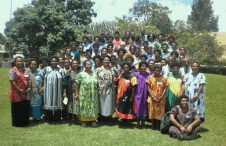
“If you are educating a man, you are educating an individual. If you are educating a woman, you are educating an entire family,” Maria Linibi says to end her presentation about the initiatives of the women group PNGWiADF.
Maria says that in Papua New Guinea, they do not communicate much as they have many languages, women are not educated, and most do not know how to use smart phones. She also noted that women work better with other women than with men.

Their group, Papua New Guinea Women in Agricultural Development Foundation (PNGWiADF), used the multi-sectoral approach for their initiatives in agriculture. They talked to the government and partnered with other institutions. PNGWiADF has women farmers who grow coffee, who are in horticulture, mining, etc.
PNGWiADF’s activities under the MTCP2 programme include: launching of a website; indigenous seeds saving program; hosting the SIS mission to PNG; solar irrigation, lighting, mobile charging, and other appliances for women; solar rice milling machines; building capacity for women, and cut flower arrangement. ###
About MTCP2
The Medium Term Cooperation Program Phase 2 (MTCP2), a five-year capacity building program supported by the International Fund for Agricultural Development (IFAD), the Swiss Agency for Development and Cooperation (SDC), and the European Union (EU), has been implemented in 19 countries across three sub-regions—Southeast Asia, South Asia, and the Pacific—engaging 1,544 sub-national farmers organizations (FOs) with a total membership of around 22 million farmers.
The funding support (total budget of $ 5 million for the whole duration of the project across 19 countries) serves as a catalytic fund that will allow FOs to enhance their capacity to be effective channels of economic services to farmers.
So far, the program has contributed to the formation of strong national platform of FOs with improved capacity to engage in policy processes and mobilize resources from mainstream agricultural development programs like extension services, credit, and pre and post harvest facilities. The program also helped in transforming farmers associations into commodity-based cooperatives to strengthen the role of small-scale farmers within an inclusive and sustainable value-chain.
The program is being implemented by the consortium Asian Farmers’ Association for Sustainable Rural Development (AFA) and La Via Campesina (LVC).

Comments are closed